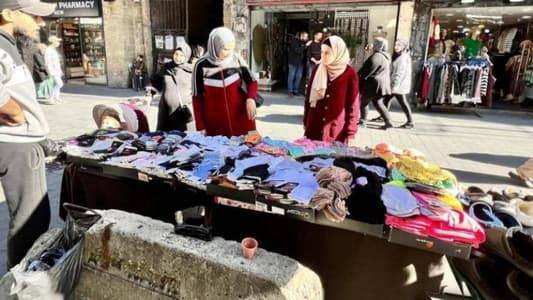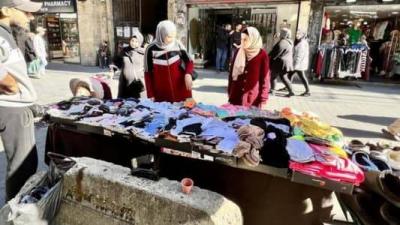The residents of Sidon are not hopeful, as their hopes for the swift election of a president to halt the economic collapse remain suspended amid ongoing disputes. The implementation of the customs dollar has heightened their fears. Salam Basho, a store owner, looks at his accumulated stock of various accessories, decorations, watches, prayer beads, umbrellas, and candles, glancing left and right as he awaits a customer, whereas his famous shop used to have at least one visitor per hour. Basho tells "Nidaa Al-Watan": "Instead of being optimistic about the election of a president and ending the vacuum, the customs dollar is applied and the dollar rises, increasing the stagnation," adding with regret, "All my products are in dollars and the urge to buy has dropped to its lowest point; we have never experienced times like these, even though we have entered the season of preparing for the end-of-year holidays, during which we should have active sales. They have stolen people's joy and turned their dream into securing daily sustenance in food and drink."
The Shakiriyah Street is one of the oldest commercial markets in the city, featuring various types of shops, from spices to falafel, bakeries, and restaurants selling fava beans, hummus, sweets, and meat and chicken, extending from the seaside fortress in the west to the countryside in the south. Across the street, Adnan Nahouli regularly arranges his assorted gifts related to Hajj and Umrah, ranging from prayer beads, perfumes, miswak, incense, henna, prayer rugs, Qurans, Quranic decorations, and children's accessories like bracelets, necklaces, and other jewelry. He says, "The decline in the number of pilgrims this year has greatly affected sales; we rely on this season in particular, in addition to organizing some Umrah trips at the end of each year until Ramadan."
In the middle of the street, a young man, Ismail Kurdi, stands behind a mobile cart, using a large knife to separate the thick shell from coconut meat, selling each for fifty thousand. He tells "Nidaa Al-Watan": "Everything has changed; people used to buy and enjoy eating coconuts because of their delicious taste when fresh, but now they ask about the price and then walk away. Some say ‘the eye is keen, but the hand is short’ and there are more pressing priorities than what is seen as a treat."
The state of recession and decline is observed by the seamstress Rodana Al-Atiq, in her workshop on the opposite street, where she learned the trade from her mother thirty years ago before opening her modest shop after working for two decades at home. Al-Atiq tells "Nidaa Al-Watan" that people "no longer buy anything but essentials; from clothing to luxuries, they have forever given up on some needs such as fruits, sweets, and even new clothes." She adds, "Customers come here to revive life into a pair of torn and worn jeans or a jacket that has seen better days; they cannot afford to replace them with new ones and they complain in their conversations about the high cost of living. People are in distress, and only God knows their situation; some might go to bed without eating."
Her neighbor, Fatima Al-Fadl, who runs an administration and accounting office, states: "Returning to the comforts of the past has become a beautiful dream but is now impossible; people have lost the most beautiful thing in life, living modestly without the humiliation of asking."




